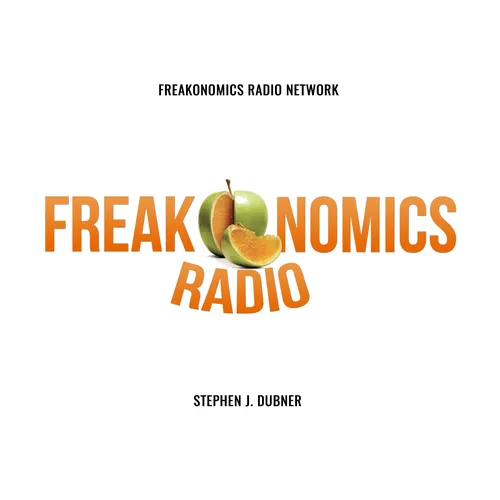
Freakonomics Radio
Freakonomics co-author Stephen J. Dubner uncovers the hidden side of everything. Why is it safer to fly in an airplane than drive a car? How do we decide whom to marry? Why is the media so full of bad news? Also: things you never knew you wanted to know about wolves, bananas, pollution, search engines, and the quirks of human behavior.
To get every show in the Freakonomics Radio Network without ads and a monthly bonus episode of Freakonomics Radio, start a free trial for SiriusXM Podcasts+ on Apple Podcasts or by visiting siriusxm.com/podcastsplus.
- Update frequency
- every 5 days
- Average duration
- 41 minutes
- Episodes
- 856
- Years Active
- 2010 - 2025

36. Hey Baby, Is That a Prius You're Driving?
"Conspicuous conservation" is about showing off your environmental bona fides. In other words, if you lean green, there's extra value in being seen leaning green.

35. Live From St. Paul!
Freakonomics Radio hits the road, and plays some Quiz Bowl

34. Things Our Fathers Gave Us
What did Levitt and Dubner learn as kids from their dads?

33. To Catch a Fugitive
Who is likelier to get to the fugitive first? When a fugitive is on the run, it’s not only the police he has to worry about. A bounty hunter could be coming after him, too.

32. Growing Up Buffett
What’s it like to wake up one day and realize Dad is a multi-billionaire? That's what happened to Warren Buffett’s son Peter -- who then started to think about whether or not to join the family busin…

31. Gambling With Your Life
Does Las Vegas increase your risk of suicide? A researcher embeds himself in the city where Americans are most likely to kill themselves.

30. Does College Still Matter? And Other Freaky Questions Answered ...
In our second round of FREAK-quently Asked Questions, Steve Levitt answers some queries from listeners and readers.

29. Smarter Kids at 10 Bucks a Pop
It won’t work for everyone, but there’s a cheap, quick, and simple way to lift some students’ grades.

28. Why Can’t We Predict Earthquakes?
We talk to a U.S. Geological Survey physicist about the science -- and folly -- of predicting earthquakes. There are lots of known knowns; and, fortunately, not too many unknown unknowns. But it's th…

27. Death by Fire? Probably Not
Fire deaths in the U.S. have fallen 90 percent over the past 100 years, a great and greatly underappreciated gain. How did it happen -- and could we ever get to zero?

26. The Health of Nations
For decades, GDP has been the yardstick for measuring living standards around the world. Martha Nussbaum would rather use something that actually works.

25. Is Twitter a Two-Way Street?
To get a lot of followers on Twitter, do you need to follow a lot of other Tweeps? And if not, why not?

24. The Power of Poop
Since the beginning of civilization, we’ve thought that human waste was worthless and dangerous. What if we were wrong?

23. Millionaires vs. Billionaires
Five things you don’t know about the NFL labor standoff

22. Why Cities Rock
Could it be that cities are "our greatest invention" -- that, despite a reputation as black-soot-spewing engines of doom, they in fact make us richer, smarter, happier and (believe it!) greener?

21. Bring on the Pain!
It's not about how much something hurts -- it's how you remember the pain. This week, lessons on pain from the New York City subway, the professional hockey rink, and a landmark study of colonoscopy …

20. Waiter, There’s a Physicist in My Soup! (Part 2)
What do a computer hacker, an Indiana farm boy, and Napoleon Bonaparte have in common? The past, present, and future of food science.

19. Waiter, There’s a Physicist in My Soup! (Part 1)
The "molecular gastronomy" movement -- which gets a bump in visibility next month with the publication of the mammoth cookbook "Modernist Cuisine" -- is all about bringing more science into the kitch…

18. Freakonomics FAQ, No. 1
Levitt and Dubner field questions from the public and hold forth on everything from dating strategies and rock-and-roll accordion music to whether different nations have different economic identities…

17. Trashed
How economics -- and emotion -- have turned our garbage into such a mess